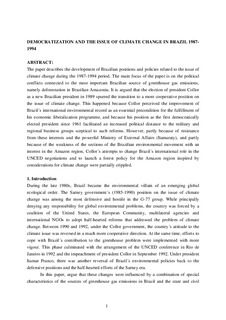| dc.contributor.author | Kasa, Sjur | nb_NO |
| dc.date.accessioned | 2014-03-17T14:31:08Z | |
| dc.date.available | 2014-03-17T14:31:08Z | |
| dc.date.issued | 1995 | nb_NO |
| dc.identifier.issn | 0504-452X | nb_NO |
| dc.identifier.uri | http://hdl.handle.net/11250/192188 | |
| dc.description.abstract | The paper describes the development of Brazilian positions and policies related to the issue of climate change during the 1987–1994 period. The main focus of the paper is on the political conflicts connected to the most important Brazilian source of greenhouse gas emissions, namely deforestation in Brazilian Amazonia. It is argued that the democratic election of president Collor as a new Brazilian president in 1989 spurred the transition to a more cooperative position on the issue of climate change. This happened because Collor perceived the improvement of Brazil's environmental record as an essential pre-condition for the fulfilment of his economic liberalisation programme, and because his position as the first democratically elected president since 1961 facilitated an increased political distance to the military and regional business groups sceptical to reforms. A modified version of the paper will appear as a chapter in G. Fermann (ed.): The politics of climate change, Scandinavian University Press 1996. | nb_NO |
| dc.language.iso | eng | nb_NO |
| dc.publisher | CICERO Center for International Climate and Environmental Research - Oslo | nb_NO |
| dc.relation.ispartof | CICERO Working Paper | nb_NO |
| dc.relation.ispartofseries | CICERO Working Paper;1995:06 | nb_NO |
| dc.title | Democratization and the issue of climate change in Brazil 1987-1994 | nb_NO |
| dc.type | Working paper | nb_NO |
| dc.source.pagenumber | | nb_NO |
